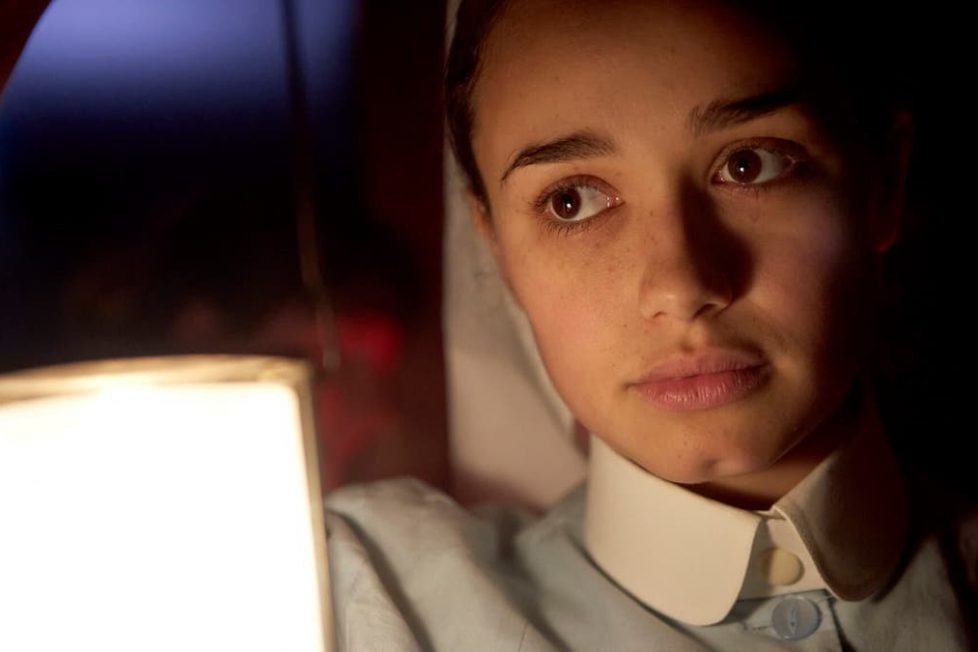THE POWER (2021)
In 1970s London, a young nurse encounters evil hidden in her hospital.

In 1970s London, a young nurse encounters evil hidden in her hospital.


One of the first colleagues young nurse Val (Rose Williams) meets at the grim London hospital where she’s started work is reading Stephen King’s Carrie. Though technically an anachronism (the novel wasn’t published until a few months after the New Year of 1974 when The Power is set), it’s an apposite choice. Like King’s tale, Corinna Faith’s second feature (and her first horror) is a feminist tale of abuse and revenge, achieved with supernatural assistance but firmly rooted in the character as well. Val has been a victim in her past, and continues to be one for the majority of the film, but eventually she finds the strength to fight back.
The setting is typical for a girl-in-peril movie, but justified with great cleverness: the miners’ strikes of the early-1970s have led the UK government to ration electricity, and most of the patients have been moved out of Val’s hospital, which is now mostly pitch-black and lit only by a few generators serving the remaining antenatal and intensive care wards (life and death). “A place people die in should never be allowed to get that dark”, says one of the nurses. But the “power” of the equally clever title refers not only to this, it also encapsulates the power the (exclusively male) doctors have over the (exclusively female) nurses, the unexplained and terrifying power that seems to lurk in the hospital and possess Val, and ultimately her own power too.
Faith cranks up the terror slowly, first introducing a series of other characters including a hostile matron (Diveen Henry), a young Asian patient (Shakira Rachman) who keeps on trying to run away (and unsurprisingly figures prominently in the denouement), a seemingly affable doctor (Charlie Carrick), and several other nurses, notably Babs (Emma Rigby) and Comfort (Gbemisola Ikumelo). Before too long, though, they become of secondary importance as something unseen starts to attack Val in the black corridors; grabbing her, shaking her, twisting her into contortions, and causing fit-like movements. It’s not until later we understand how this connects with earlier and more prosaic attacks Val suffered when living at a children’s home.
The Power uses its location well, exploiting not only the inherent creepiness of large empty spaces but also the uncomfortably physical connotations of hospitals. Generators glow demonic red but, more often, the colour scheme is a sickly yellow-green with a washed-out spectral air. Faith and cinematographer Laura Bellingham make precise visual choices, including unusual angles, reflections, and many overhead shots (a ghost’s-eye-view?), and perhaps these can be almost too stylish at times. They detract a little from the raw and genuinely frightening “possession” sequences, as well as the harsh #MeToo-flavoured reality of Val’s situation.
However, it’s certainly a good-looking movie, and a fine one to listen to as well, with outstanding sound design and an effective score from Elizabeth Bernholz and Max de Wardener. Despite beginning with the synthesised-choir effect that’s become the most dreaded of all horror-movie music clichés, the soundtrack develops into a quite original take on the genre’s musical conventions.
Williams is a strong and expressive lead with a believable mixture of assertiveness and nervousness, handling Val’s discovery of her own inner resources both forcefully and convincingly. Henry is wonderfully unlikeable as the matron, while Rigby has an almost uncanny air in her nurse role which adds to the general atmosphere of disquiet, and Ikumelo is especially notable in a significant part as another nurse struggling to maintain rationality in the face of the irrational.
The Power can be a touch unsubtle (for example, superimposing Val’s face first on a poster about abuse, and then on a drawing of a person shushing their lips with a finger, rams home points which emerge quite clearly anyway). And of course many of the central ideas and visuals of darkness, a young girl alone, and an institution with secrets, are extremely familiar genre mainstays.
But Faith weaves fresh variations onto these themes, draws convincing unshowy performances from her cast, handles the physical manifestations of the haunting with verve, and never gives the impression that the currently topical abuse theme has been shoehorned into a more conventional horror story. It all fits together very persuasively, and delivers some very skilful scares while pursuing its more serious agenda.
If you enjoyed this article, please consider buying me a coffee.
UK | 2021 | 92 MINUTES | COLOUR | ENGLISH
writer & director: Corinna Faith.
starring: Rose Williams, Emma Rigby & Charlie Carrick.
